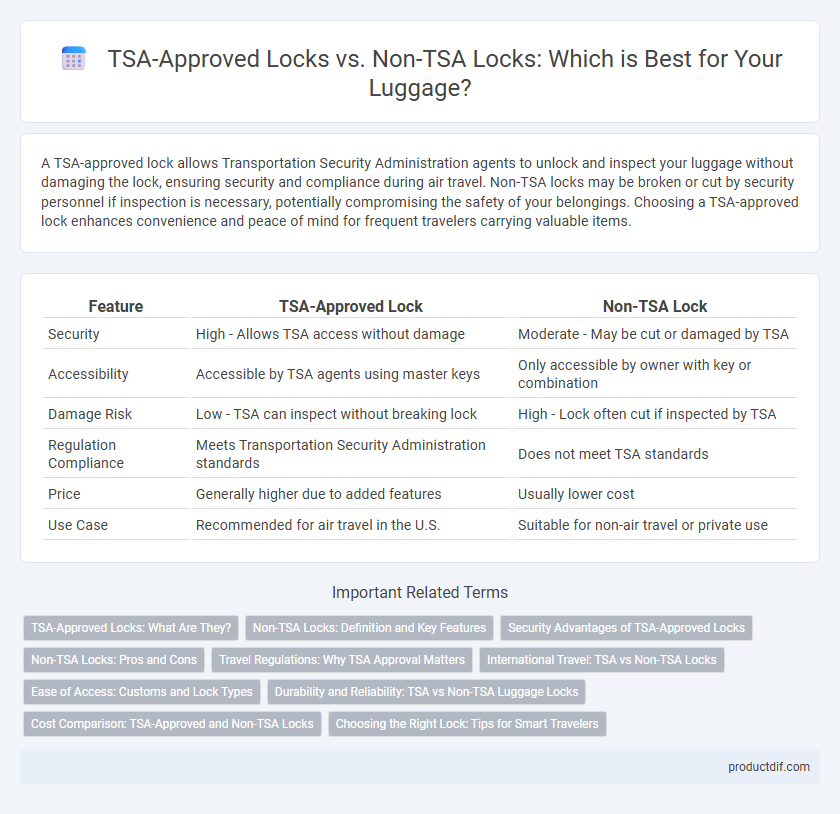A TSA-approved lock allows Transportation Security Administration agents to unlock and inspect your luggage without damaging the lock, ensuring security and compliance during air travel. Non-TSA locks may be broken or cut by security personnel if inspection is necessary, potentially compromising the safety of your belongings. Choosing a TSA-approved lock enhances convenience and peace of mind for frequent travelers carrying valuable items.
Table of Comparison
| Feature | TSA-Approved Lock | Non-TSA Lock |
|---|---|---|
| Security | High - Allows TSA access without damage | Moderate - May be cut or damaged by TSA |
| Accessibility | Accessible by TSA agents using master keys | Only accessible by owner with key or combination |
| Damage Risk | Low - TSA can inspect without breaking lock | High - Lock often cut if inspected by TSA |
| Regulation Compliance | Meets Transportation Security Administration standards | Does not meet TSA standards |
| Price | Generally higher due to added features | Usually lower cost |
| Use Case | Recommended for air travel in the U.S. | Suitable for non-air travel or private use |
TSA-Approved Locks: What Are They?
TSA-approved locks are specially designed security devices that comply with Transportation Security Administration guidelines, allowing airport security personnel to unlock and inspect luggage without damaging the lock. These locks feature a universal master key mechanism accessible only to TSA agents, ensuring luggage remains secure while facilitating smooth security checks. Choosing TSA-approved locks reduces the risk of forced lock breakage and helps travelers meet airport security regulations efficiently.
Non-TSA Locks: Definition and Key Features
Non-TSA locks are traditional luggage locks that do not allow Transportation Security Administration agents to use master keys for inspection, often requiring the lock to be cut if screening is needed. These locks provide basic security by preventing unauthorized access but pose a risk of damage during mandatory security checks at airports. Common features include combination dials, key entry mechanisms, and compact designs suitable for various types of luggage.
Security Advantages of TSA-Approved Locks
TSA-approved locks provide enhanced security by allowing Transportation Security Administration agents to inspect luggage without breaking the lock, preventing damage and maintaining integrity. These locks use a universal master key system, enabling authorized personnel to access bags during security checks while keeping unauthorized access difficult. Non-TSA locks offer less convenience during inspections, often resulting in forced entry and compromised security.
Non-TSA Locks: Pros and Cons
Non-TSA locks offer enhanced privacy by preventing TSA agents from accessing luggage without owner consent, reducing the risk of unauthorized searches. However, non-TSA locks pose challenges during airport security checks, as agents may forcibly cut them to inspect contents, potentially damaging the lock or luggage. These locks are ideal for travelers prioritizing security over convenience but may result in delays or lock replacement after inspections.
Travel Regulations: Why TSA Approval Matters
TSA-approved locks comply with U.S. Transportation Security Administration regulations, allowing security officers to unlock and inspect luggage without damaging the lock. Non-TSA locks may be cut or broken if agents need access, causing potential damage and inconvenience. TSA approval ensures smoother security checks and reduces the risk of lost or damaged locks during air travel.
International Travel: TSA vs Non-TSA Locks
TSA-approved locks enable Transportation Security Administration agents to unlock and inspect luggage without damaging the lock, a critical feature for international travel where security inspections are common. Non-TSA locks might be cut off by authorities if inspection is required, risking loss of security and additional expenses. Choosing TSA-approved locks ensures compliance with global travel security protocols, protecting belongings and facilitating smoother border crossings.
Ease of Access: Customs and Lock Types
TSA-approved locks allow customs officials to access luggage for inspection without damage, using specialized master keys recognized only by Transportation Security Administration agents. Non-TSA locks may be cut or broken during inspections, causing damage and inconvenience to travelers, as customs agents cannot unlock them without the key. Choosing TSA-approved locks ensures smoother customs processes and protects luggage integrity during security checks.
Durability and Reliability: TSA vs Non-TSA Luggage Locks
TSA-approved locks feature reinforced materials designed to withstand repeated inspections by Transportation Security Administration agents without compromising security, ensuring enhanced durability. Non-TSA locks often lack the same level of robustness, increasing the risk of damage during forced entry or security checks, which reduces reliability. Travelers seeking secure and long-lasting luggage protection benefit from the proven strength and dependable design of TSA-approved locks.
Cost Comparison: TSA-Approved and Non-TSA Locks
TSA-approved locks generally cost more than non-TSA locks due to their specialized design and regulatory compliance, with prices ranging from $15 to $40 compared to $5 to $20 for standard locks. The higher price reflects the added security features and the ability for TSA agents to open and relock them without damage during inspections. Investing in TSA-approved locks can reduce the risk of forced entry and luggage damage, potentially saving money in the long run despite the initial higher cost.
Choosing the Right Lock: Tips for Smart Travelers
TSA-approved locks allow Transportation Security Administration agents to unlock and inspect luggage without damaging the lock, making them essential for travelers flying within or to the United States. Non-TSA locks may offer strong security but risk being cut off during mandatory inspections, leading to potential inconvenience and additional costs. For smart travelers, selecting a TSA-approved lock ensures compliance with airport security protocols while maintaining luggage protection throughout the journey.
TSA-approved lock vs Non-TSA lock Infographic

 productdif.com
productdif.com